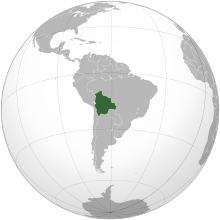LGBTQ rights in Bolivia
LGBTQ rights in Bolivia | |
|---|---|
 | |
| Status | Yes |
| Military | No |
| Discrimination protections | Yes |
| Family rights | |
| Recognition of relationships | No |
| Restrictions | Same-sex marriage not allowed |
| Adoption | Married and single people allowed to adopt |
Lesbian, gay, bisexual, and transgender (LGBT) persons in Bolivia may face legal challenges not experienced by non-LGBT residents. Both male and female same-sex sexual activity is legal in Bolivia.
Law regarding same-sex sexual activity
Same-sex sexual activity is legal.
Discrimination protections
Article 14(II) of the Constitution of Bolivia, implemented in February 2009, prohibits discrimination based on sexual orientation and gender identity.[1][Note 1] Article 281ter. of the Penal Code criminalizes discrimination based on sexual orientation or gender identity.[Note 2] This law was added in 2010 by Article 23 of the Law Against Racism and All Forms of Discrimination.[2]
These protections, however, are not always carried out.[3]
In December 2013 the Armed Forces announced intention to allow gays and lesbians to serve in its ranks from 2015.[4]
Recognition of same-sex unions
Article 63 of the constitution limits legally recognized marriage to opposite-sex unions.[1]
In July 2010, Vice President Álvaro García Linera said that the government had no plans to legalize same-sex marriage.[5]
In April 2012, a member of the opposition coalition, the National Convergence, introduced a bill in the Plurinational Legislative Assembly to legalize same-sex civil unions.[6][7] However, the bill has not advanced.[8]
In July 2014 Bolivia's public advocate Rolando Villena called for same-sex unions to be included in the country's new Family Code.[9] On 16 October 2014, the Bolivian Senate passed a revised Family Code that did away with any gender terms. Couples were hoping that this may open the door to giving gay couples many rights that heterosexual couples enjoy. The Code was approved in the House Of Representatives, and pending promulgation, will be enacted in August 2015.[10] The final draft awaiting promulgation, made no mention of gender, but it was clarified that it has no legal weight to apply to gay couples, as a separate law is needed. LGBT rights groups have begun asking the government to pass a law so they may finally be recognised.[11]
Adoption of children
Bolivia allows both married and single people to adopt children.[12]
Summary table
| Gay sex legal with equality on age of consent | |
| Anti-discrimination laws in employment | |
| Anti-discrimination laws in all other areas | |
| Hate crimes laws covering both sexual orientation and gender identity | |
| Gays allowed to serve in the military | |
| Recognition of same-sex couples (e.g. civil unions) | |
| Same-sex marriage | |
| Adoption by same-sex couples | |
| Right to change legal gender | |
| Access to IVF for lesbians | |
| MSMs allowed to donate blood |
See also
Notes
- ^ The official text of Article 14(II) in Spanish (Constitución Política del Estado):
El Estado prohíbe y sanciona toda forma de discriminación fundada en razón de sexo, color, edad, orientación sexual, identidad de género, origen, cultura, nacionalidad, ciudadanía, idioma, credo religioso, ideología, filiación política o filosófica, estado civil, condición económica o social, tipo de ocupación, grado de instrucción, discapacidad, embarazo, u otras que tengan por objetivo o resultado anular o menoscabar el reconocimiento, goce o ejercicio, en condiciones de igualdad, de los derechos de toda persona.
- ^ The official text of Article 281ter. in Spanish (Ley Contra el Racismo y Toda Forma de Discriminación):
La persona que arbitrariamente e ilegalmente obstruya, restrinja, menoscabe, impida o anule el ejercicio de los derechos individuales y colectivos, por motivos de sexo, edad, género, orientación sexual e identidad de género, identidad cultural, filiación familiar, nacionalidad, ciudadanía, idioma, credo religioso, ideología, opinión política o filosófica, estado civil, condición económica o social, enfermedad, tipo de ocupación, grado de instrucción, capacidades diferentes o discapacidad física, intelectual o sensorial, estado de embarazo, procedencia regional, apariencia física y vestimenta, será sancionado con pena privativa de libertad de uno a cinco años.
References
- ^ a b Template:Es Constitución Política del Estado
- ^ Template:Es Ley Contra el Racismo y Toda Forma de Discriminación
- ^ 2011 Country Reports on Human Rights Practices: Bolivia, Bureau of Democracy, Human Rights and Labor, U.S. Department of State, page 18
- ^ Template:Es Las FFAA darán cupos a gais para que ingresen a sus filas
- ^ Template:Es "Gobierno boliviano no tiene en sus planes aprobar el matrimonio gay", Sentidog, 17 July 2010
- ^ Template:Es"El Parlamento boliviano estudia ley para reconocer concubinatos homosexuales", ABC.es, 11 April 2012
- ^ Template:Es"Proyecto para aprobar matrimonios gay entra al Legislativo", HoyBolivia.com, 9 April 2012
- ^ Template:Es Séptimo Día. Matrimonio homosexual, aún no hay debate en Bolivia. Retrieved 13 January 2014.
- ^ "Bolivia's Public Advocate Calls On Government To Allow Same-Sex Civil Unions"
- ^ Template:Es"Nuevo Código de Familias boliviano da derechos a uniones del mismo sexo"
- ^ Código de familia plantea que la fidelidad sea un deber conyugal
- ^ "Intercountry Adoption: Bolivia", Bureau of Consular Affairs, United States Department of State, October 2009
- ^ "Age of Consent in Latin America", QMaxine, 19 November 2013
- ^ "Human Rights Report 2012" U.S. Department of State, 19 November 2013
